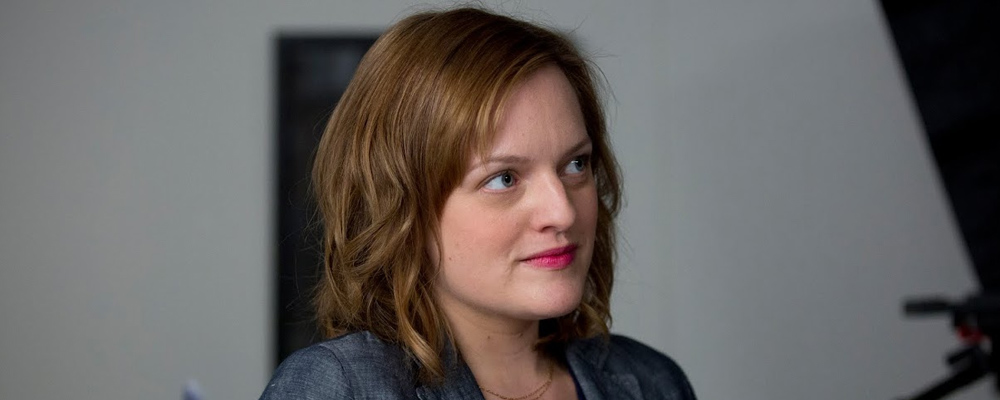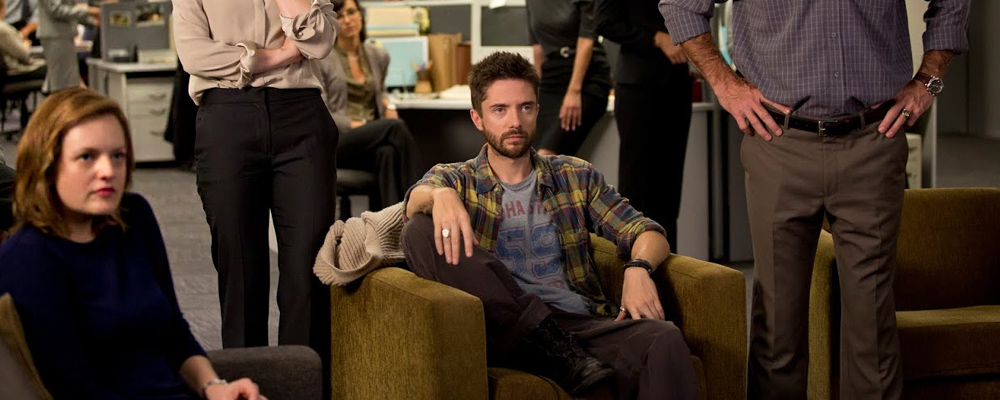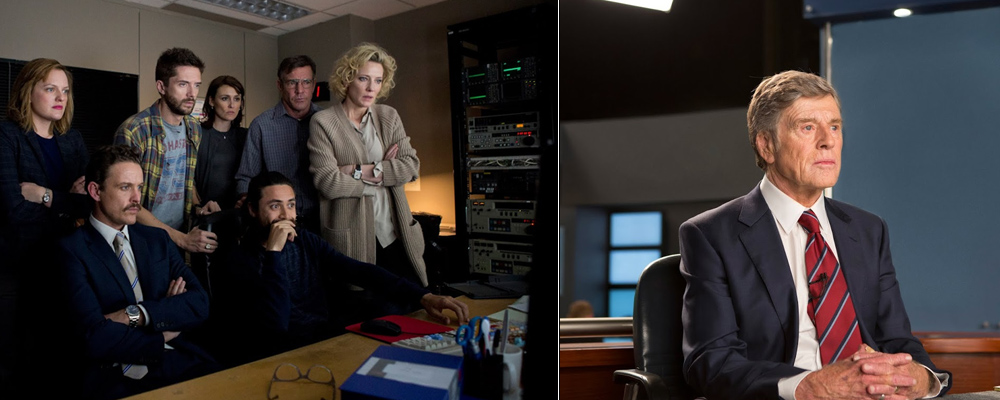Actress Elisabeth Moss Talks About What New Political Drama ‘Truth’ Means to Her
Sandra Miska
Multiple-Emmy nominee Elisabeth Moss, who is best known for her role as copywriter Peggy Olson on seven seasons of “Mad Men,” has been keeping busy since the series wrapped. In August, she starred in the psychological drama “Queen of Earth,” and this month she can be seen alongside Cate Blanchett and Robert Redford in the political drama “Truth.”
“Truth” is based on Mapes’ 2005 memoir “Truth and Duty: The Press, the President and the Privilege of Power.” The film that takes place in the midst of the 2004 presidential campaign. Moss plays Lucy Scott, an investigative journalist and professor who assists “60 Minutes” producer Mary Mapes (Blanchett) in uncovering the truth regarding George W. Bush’s military service in the Vietnam era.
Moss recently sat down with Entertainment Voice to talk about “Truth,” “Mad Men,” how she chooses her roles, filming in Australia, and what the future has in store for her.
What attracted you to “Truth?”
For me, initially, it was definitely Cate and Bob. The chance to do anything with them, with either of them, would’ve been incredible. Together, obviously, is just beyond my wildest dreams. And then I read the script, and it was just a really beautiful story and a really good script and a film that I wanted to see. I like to do things where I would actually want to see the movie.
What was unique about working with Cate and Robert?
I mean, they’re two of my favorite actors of all time, and as a woman, obviously, Cate is one of my idols and I just think that she’s one of the greatest living actresses. To just watch her is something that I enjoy; to actually be in a scene with her is just, again, beyond my wildest dreams. And then, Mr. Redford I’ve met over the years a couple of times, just because “Top of the Lake” was on the Sundance Channel, and I went to the Sundance Directors Lab years and years and years ago, and I’ve been to the festival, so I’ve met him a couple of times, but I still can’t get over the fact that he knows my name or remembers me, you know? [Laughs]. I just can’t quite get used to it.
Did you get to meet the real Lucy?
No, I didn’t get to meet her, and I’m really excited to see what she thinks of the film. You know, I heard that she heard that I was playing her and she was happy with it, and that’s sorta all I needed. I think when you’re dealing with a story like this that has so many moving parts to it, the important thing is to tell the story, and I think we didn’t want to get bogged down in making sure, “Why didn’t my hair look like hers?” You know? “Why didn’t my voice sound like hers?” I think what’s important is to get the facts across and to tell the story in the clearest way possible, and so with me and Dennis [Quaid] and Topher [Grace], we took something from the book, Truth and Duty, but it was less about that for us.
Were you interested in journalism before the film?
Not really. To be perfectly honest, I have very few boring interest. [Laughs]. So for me, I don’t have any sort of interest beyond the next person. What struck me making this film and reading the book and thinking about it, was the amount of time that’s put into a story like this. The weeks, the months that they live with this. The research. They’re really like detectives. The phone calls. The boring work that is done day after day. It’s not exciting. We make it look far more exciting than it is. It’s definitely way more exciting. We have nice montage where they make phone calls. In reality, that took weeks to do. So, I think what really struck me is the amount of dedication and work that goes into a story.
You’re known for television, and you’ve done several films and theater. What’s your favorite? Do you miss being on a TV set regularly?
No, for me they’re so interchangeable. I can’t tell the difference. The only difference about TV is that you live with the character for a long time. But I only have really done that once with “Mad Men,” as far as, you know, a lead character that I live with for a long time. …I do things based on the script, and so, I tend to just try to find where the good material is. For me, if that’s in theater, great; if that’s in TV, great; film, great, I don’t care. It’s just a matter of where the good scripts are, and I think you have to be open to the fact that that can be anywhere these days.
Speaking of “Mad Men,” what was your favorite episode?
“The Suitcase,” probably. Yeah, that’s my favorite.
I really enjoyed your film “Queen of Earth.” How did you prepare for that role? Did you ever have a frenemy relationship like that?
No. That we shot in two weeks. I loved the script so much, and I knew exactly what he [writer/director Alex Ross Perry] wanted. So, no, there wasn’t any preparation that I did for it, really. I was a producer on it, as well, so it was a little bit about casting, but other than that, no. The great thing about it was we shot it almost entirely in order, so I was able to really develop the character as I went along, as opposed to having to have an idea from the beginning of where she was going to end up. So that was a really kinda interesting, organic process. I didn’t have to sorta go, “Okay, this is how crazy I want her to be at the end.” I just kinda just saw where it went, and just kept playing and going further and further.
Did you ever feel really intense on set?
No. Alex says that I would go and listen to music and be quiet and stuff. I guess I did. But, no, I’m very much not a method actor. I’m not very serious on set. Besides, sometimes, you know, occasionally I just don’t want to talk much, because it’s just tiring.
You had to get in the zone.
Yeah, just, like, get in the zone, but other than that, no. You can’t get too intense when you’re moving quickly and you have to talk about the next scene. You have to just, you know, be where you need to be, but at the same time not take it too seriously.
This was a serious movie, “Truth,” and “Queen of Earth” was quite serious. Would you ever do another comedy, like “Get Him to the Greek?”
Yeah, I think so. I prefer, I suppose, films that walk that line between comedy and drama, which I think “Mad Men” sorta did. I would love to do something that was just a straight comedy. I think it’s super, super fun, but for me, I just go where the good scripts are. I’m not like, “Oh, I want to do a comedy” or “Oh, I want to do a drama.” I just don’t think that way. I try to do what I think is the best script, and sometimes that’s a difficult decision and at a certain point you just have to kinda go with your gut a little bit.
What’s next for you?
Well, let’s see. This is coming out, and then “High-Rise” is coming out, this Ben Wheatley film that I did. I have a tiny part in this film called “Meadowland,” and then this summer I did “The Seagull,” which is based on the Chekhov play. We did a film version with Annette Benning and Saoirse Ronan and Corey Stoll and an amazing cast. And then I did this film called “The Free World” in New Orleans, with Boyd Holbrook, which is a really, really, really cool script and really kinda a little bit on the dark side. So, all of those are just coming out, and in editing, and various states of composition.
Would you go back to TV?
Oh, for sure, yeah, absolutely. I mean, you know, I think that- I was having a conversation about this the other day. I think you have to just close your eyes to what is on film, to what is on TV and go where the good material is. I just don’t think it matters. I love television. I mainly watch television instead of film.
Me too.
Yeah. [Laughs]. I think there’s so many great parts and great material, that I should be so lucky.
Do you have any advice for someone who wants to break into acting?
Gosh. Here’s the thing. I had an experience that was unusual, in the sense that I’ve been working for a really long time. I’ve been steadily working for a long time. So, I didn’t necessarily take this route, but, I think it’s actually really important to get into some sort of, I don’t if it necessarily has to be an acting class, but a group, a theater group, you know? A playwriting group, a directing workshop, whatever it is to just learn and practice. For me, I didn’t go to college; I didn’t have formal training. I did have training, though, it just happened to be on set. It happened to be on small films and television, it happened to be on commercials, it happened to be sorta while I was working, but I was constantly learning, and I think learning to work with different types of people, learning to work with different personalities, on different material, and I think that, I don’t know if I believe so much in the critiquing process of an acting class, but I do believe in the practice, and in getting there and trying things, and I think that, you know, unfortunately acting isn’t one of those things like, you know, playing an instrument or painting that you can do it on your own. You can’t just do it in your bedroom. You have to actually have another person to act with, and you have to have an audience of some sort, or you have to have a setting that provides you to do a scene. So I think that it is important to get into some theater group or workshop or something and just keep practicing and trying things.
That makes sense. It’s the people around you.
Absolutely, and learning from people around you and learning from other actors, and learning your own limitations and what you need. I think that that is all very helpful. You’re not an actor unless you’re really acting. You can’t call yourself an actor. You have to get out there and do it. And there’re many ways to do it that don’t involve a paying gig. Hopefully at some point it does, obviously, but I think that especially getting into theater is a really, really good thing.
You’re an actress and you produce. Would you ever direct or write?
Definitely not write. Writing, I think is impossible. And I just think it’s so hard and I have very little interest in it. I don’t know, directing, maybe one day. I’m not totally sure. For me, I feel like producing is really where I enjoy myself. I like putting people together that I’ve worked with. I like crafting something in the beginning, in that sense. I love the casting process. Being an actress, the casting process is so interesting, so, for me, that is where I get a little excitement and I have more of a passion for it than directing. But you never say never.
So you’re more interested in the steps that lead up to production?
Yeah, and just during the production, making those decisions. I’ve been working for a really long time and have a certain amount of experience, and it’s interesting to use that experience in a different way. Getting into casting a little bit is so interesting as an actor, because I’ve been on the other side so many times, and finding myself saying the things that I’ve heard, whether it’s, “That person’s not famous enough, or, “I’ve never seen that person’s movie.” Finding myself saying those things is so interesting, and it actually gives you, I don’t know, just a greater understanding of the process. I think, also, being an actor, I’m a little bit more willing to take a chance on an actor that maybe isn’t famous yet, or hasn’t done a big movie, because I know what it’s like to be that person. So that, to me, is just the most fascinating part of the process.
Is it like taking on a little bit of a mentor role?
I don’t know about that, because I don’t really believe I have a whole lot to teach anybody. But more, just, I love actors and I personally love acting myself, so for me that’s where I feel I have the most experience. You know, I don’t know a lot about cinematography, so I’m not going to bother with that. That’s up to the director. But for me, the acting and the script and the locations and all those things I find really fun and interesting.
Where did you film “Truth?” I know at least one scene was shot was in L.A. Was the majority done in New York?
No, it was in Australia. It was mostly in Australia. For me, having shot “Mad Men” in L.A. for nine years, it’s not crazy to me. They shoot Canada for places all the time. For me, it’s not that different. It was nice to be able to go to Australia.
What was unique about Australia?
I’ve spent a fair amount of time in that hemisphere and in Australia, so I’m sorta used to it. To me, Sydney reminds me so much of a San Francisco than L.A., so to me, in a lot of ways, it’s not that different. Melbourne kinda reminds me of Chicago. Also, we live in a time where, with the internet and the way things are, you know, you go to a major metropolitan city, and it’s not going to be that crazy. I haven’t had the opportunity to go to the Outback or more of the more unique, unusual parts of Australia, so the next I go back I would like to do that. I’ve spent a lot of time in Sydney and a lot of time in Melbourne, but I would like to see some of Australia that is actually very, very, very unique. The most unique thing for me, honestly, is just the feeling of distance. You just really do feel like you are far away. For me, I like it [laughs]. I like it. I love traveling and love being on location. Yeah, the time difference really gives the sense of being in a different hemisphere. It is different, you know? And the people are so nice. People are nice here too.
I’ve never been, but I’ve heard that about people in Australia are more similar to Americans than they are to the British, culturally.
Yes, I would agree. There’s a very sociable atmosphere. There’s a very great sense of humor… They’re very kind, open people. But I like the British too [Laughs]. I’m half-British.
“Truth” opens Oct. 16 in Los Angeles and New York and is in theaters everywhere Oct. 30.



